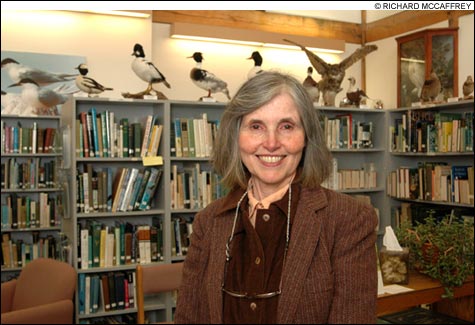
Island’s beaches. |
Decades after the birth of the modern environmental movement, the US and other nations are still struggling to come to terms with humanity’s impact on the planet. Look around and it’s all too easy to see evidence of our wasteful ways, whether it’s the SUVs clogging highways or the throw-away packaging used to wrap your lunch.
Yet the growing awareness around global warming — which has come about mostly in the last two years — suggests how we can begin to begin to come terms with the legacy of a looming man-made catastrophe.
The related movement to go green, to offer a more sustainable future, is growing in Rhode Island, as elsewhere. Here’s a look at some of our state’s leaders in this effort.
The power of one
Eugenia marks shows how individuals can make a difference
Ever feel a bit powerless in the fight for a better planet? Well, stop being a self-pitying slouch and get moving. Eugenia Marks offers proof positive of how even an individual can make a big difference in making some real environmental progress.
Marks, who works as the senior director for policy at the Audubon Society of Rhode Island, has for years organized volunteers to help clean and document the trash littering beaches around the Ocean State. Over time, the effort has grown to encompass 86 sites, up from an initial five, and more than 1500 people take part.
Since cigarette butts are the most common form of local beach trash, Marks successfully lobbied for a “voluntary ban” on smoking at state beaches, and seemingly as a result, far fewer butts were found littering the sands during this year’s cleanup.
The advocate says she spent a lot of time outdoors, fishing in tidal rivers and the ocean, while growing up in central Florida, although she didn’t become a professional environmentalist until she was in her 40s. After a wide-ranging career in which Marks worked for the Poetry Society of America, as an educator in inner-city Atlanta, and a proponent of community gardens in Chapel Hill, she earned a master’s in environmental studies at Brown after coming to Rhode Island in 1972.

While that was a long time ago in terms of the environmental movement, Marks defines her outlook by the changes that still need to take place, rather than the strides that have already been made. Considering how most people still require a greater appreciation of the wider effect of their actions, she says, “The trash we see on the beach is just an indication of our lack of respect for the environment.”
A better way to do take-out
Giving new life to recycled bottles
Ever feel a twinge of guilt while tossing yet another take-out food container in the trash? It doesn’t take a committed environmentalist to realize that this kind of disposal — multiplied exponentially across America — equals a staggering amount of waste. According to SmartCycle, a Jamestown-based company, more than 25 million tons of plastic packaging is sold in the US every year. And while this quantity is enough to fill Yankee Stadium to the brim more than 500 times, less than five percent of it gets recycled.
Cycle aims to take a bite out of this problem by using recycled bottles to make recyclable food packaging.
The company’s Web site touts how, by creating a new use for recycled bottles, it’s stimulating recycling efforts while also utilizing a manufacturing process that uses less energy. Beyond the inherent appeal, it’s hard not to appreciate an outfit that mixes a noble mission (“We want to hand Earth off to the next generation a little better than it was”) with an entrepreneurial motto (“Our vision is a world where plastic packaging is seen not as waste, but as a resource”).
SmartCycle, a family business that recently added the green element, has partnered with a number of packaging companies, and it says it has received positive interest from retailers. What can consumers do to help? “It’s easy. Just look for the SmartCycle logo on plastic food containers. We’re not everywhere yet but we’re working on it. And with your help, we’ll be a promising step closer to a healthier planet.”